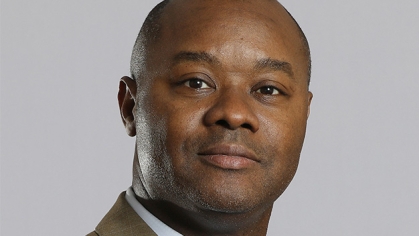Alex Hinton Wins Anthropology in Media Award for Raising Awareness of Genocide and Human Rights

Alexander Hinton of Rutgers-Newark has won the American Anthropological Association’s 2022 Anthropology in Media Award, given to individuals who have raised public awareness of the field.
The honor, whose past recipients have included Jane Goodall and science-fiction writer Ursula LeGuin, is awarded to anthropologists who have had a broad and sustained public impact at the local, national and international level.
Hinton, an anthropology professor who is Director of the Center for the Study of Genocide and Human Rights, and the UNESCO Chair in Genocide Prevention, has authored numerous books and regularly appears in the media, doing interviews and writing op-ed pieces for a host of outlets, including PBS News Hour, the Los Angeles Times, The Diplomat, MarketWatch and The Conversation, on topics ranging from the Cambodian genocide under dictator Pol Pot in the 1970s to the threat of fascism and genocide in the United States following the rise of former President Donald Trump.
Upon receiving the award, Hinton was keenly aware of the significance of the honor and deeply appreciative of being recognized by his peers.
“Given the people who have won this award, I was surprised to receive it,” said Hinton, “and honored and grateful for the recognition.”
Hinton has made it his life’s work to examine and demystify genocide and atrocities for both academic and lay audiences. He has written more than a dozen books, including the award-winning Why Did They Kill? Cambodia in the Shadow of Genocide (University of California Press, 2004), Man or Monster? The Trial of a Khmer Rouge Torturer (Duke University Press, 2016), The Justice Façade: Trials of Transition in Cambodia (Oxford University Press, 2018), It Can Happen Here: White Power and the Rising Threat of Genocide in the U.S. (NYU Press, 2021), Anthropological Witness: Lessons from the Khmer Rouge Tribunal (Cornell, 2022), and the forthcoming Perpetrators: Encountering Humanity’s Dark Side (Stanford University Press, 2023).
Hinton has also informed the public in other ways, most notably in 2016, when he provided four days of Externalexpert testimony Externalat the U.N.-backed Extraordinary Chambers in the Courts of Cambodia (ECCC), holding forth and being grilled by defense lawyers at the trial of senior leaders of the Khmer Rouge, who from 1975 to 1979 carried out one of the worst genocides in human history, killing an estimated one-fourth of Cambodia’s population, or some 3 million people. That trial, and Hinton’s testimony, were covered by news outlets throughout the world, and his book Anthropological Witness examines the trial in detail for readers.
“As academics, we’re trained in theoretical language, but when communicating to the general public, you have to be clearer and more granular,” said Hinton. “I’ve had to work hard to change the way I write, speak and participate in interviews. So, this award is extra meaningful not only because of who has received it in the past but also because it recognizes that work.”
In its announcement of the award, the American Anthropological Association noted how Hinton’s entire body of work has communicated the importance of anthropology to the larger public and increased visibility of the discipline.
“By allowing the general public access to the study and profession of anthropology, we facilitate contribution to and understanding of the field of anthropology itself,” the announcement said.
This is actually the second honor that Hinton has received from the Association.
In recognition of his work on Genocide, the organization awarded him the 2009 Robert B. Textor and Family Prize for Excellence in Anticipatory Anthropology for his groundbreaking 2005 ethnographical book, Why Did They Kill? Cambodia in the Shadow of Genocide, citing as a “path-breaking work in the anthropology of genocide, and for developing a distinctively anthropological approach to genocide.”
While Hinton is grateful to have received both awards, he recognizes the special role this latest honor plays in the larger context of U.S. and international culture.
“Anthropology as a discipline is not recognized enough in the public domain for all the knowledge it brings, unlike Political Science, History and some other disciplines,” said Hinton. “That’s another reason this award itself is important, and why I’m happy to receive it.”


